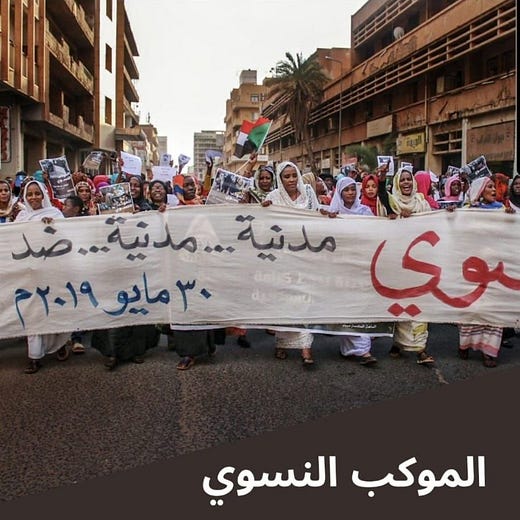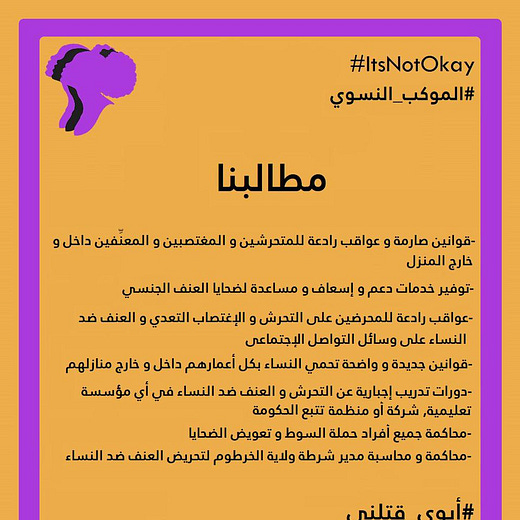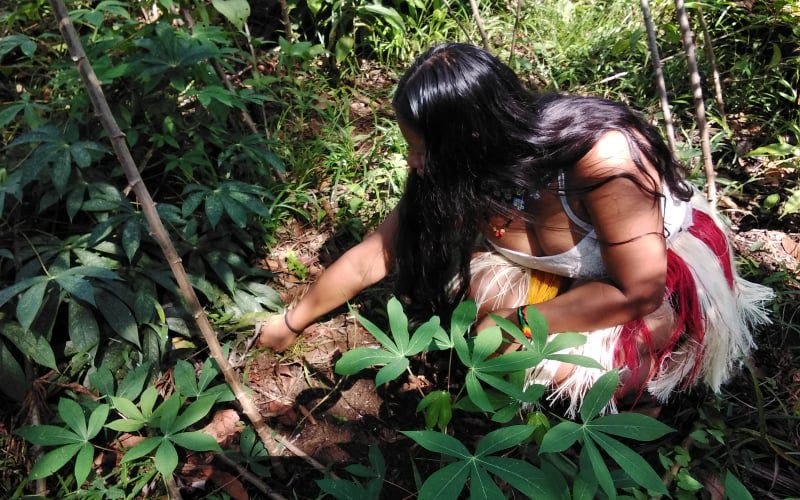Global Roundup: Fighting GBV in Sudan and Kenya, Colombian Indigenous Women Stopping Amazon Deforestation, Kyoko Takenaka’s Film Home, Changing the Face of Mental Health in the Latinx Community
Compiled by Inaara Merani
Source: @gezlan259 on Twitter
Hundreds of Sudanese women gathered in Khartoum last week to protest against gender-based violence and misogynistic restrictions against women in Sudan. Social media was used to organize the protests and mobilize those attending.
Protesters demanded stricter laws and consequences for people who commit acts of sexual violence against women, both inside and outside the home, as well as support, services and aid for victims of sexual violence. Sudanese women are also demanding compulsory training courses - in every institution, company or organization - on harassment and violence against women.
In March, Lieutenant General Eisa Ismail, the director of the Khartoum state police, was criticized for suggesting that the Public Order Law be reinstated. This law, repealed in 2019, forbade women from wearing trousers, dancing or interacting with men outside of their family.
Calling for the prosecution and accountability of Ismail for inciting violence against women was among the many demands.
On the evening of the protest, the hashtag ‘Women’s parade’ was trending, with over 17,000 people using it to bring awareness to the movement. Thousands of women took to Twitter to share their stories, and to emphasize the need for action in Sudan.
Like many other countries, Sudan has witnessed a rise in GBV during the Covid-19 pandemic, which is why it is now more necessary than ever to implement effective measures. Sudan has also experienced a number of challenges in recent years, due to an unstable transition of power. Under former President Omar al-Bashir’s 30-year rule, there were no laws in place which protected women and girls. Currently, the government is working towards the fulfillment of all rights for women and girls - last year, the government criminalized and outlawed FGM. While the fight is nowhere near complete, Sudanese women will not back down and will continue to fight for their rights.
———————————-
Taita-Taveta Deputy Governor Majala Mlaghui at a past event. In December last year, she led women leaders in the county at a forum where they agreed to work together to end GBV in the region. Photo credit: Jeff Angote | Nation Media Group
In Taita Taveta, Kenya, the Country Gender Working Group is creating a data collection tool to address rising cases of sexual and gender-based violence (SGBV) in the area. Taita Taveta is one of the country’s counties with the highest number of SGBV incidents, yet there is no official data collection which takes place; therefore, the county has been unable to develop effective measures to combat this rising issue. Hospitals and the police are responsible for collecting numbers, however much of the data is incomplete or inaccurate.
Some cases are reported to the police and others at health facilities. A harmonised reporting tool is critical in ensuring data is collected at a centralised place for accuracy and credibility - Stephen Mulinge, National Council for Population and Development Coast region coordinator
Functioning electronically, this proposed tool will collect data from different providers including: hospitals, police, courts, children offices, education institutions, and NGOs, so that the data is holistic and inclusive of all sectors. The tool will be customized specifically for the county and if approved, it will also be adopted as a legal tool which can be presented in court.
The data will help us in ensuring that matters of SGBV including development and implementation of programmes, policies, funding among others are based on accurate numbers - Wallace Mwaluma, Taita Taveta County Director of Gender
Currently, stakeholders in the county are also constructing a GBV centre in Mwatate which will house victims. Many victims are forced to live with their abusers due to a lack of safe houses, while others are targeted and threatened after their case has been dismissed due to a lack of evidence. Once the centre is fully operational, it will offer mental health support, legal advice, medical care, and food to survivors. Once construction is complete, the county government has agreed to sustain the centre.
—————————————
Nancy del Pilar Padua Palacios, a Tucano Indigenous woman in the La Asunción reservation, Guaviare | Foto: Nancy Padua
In Guaviare, Colombia, Nancy del Pilar Padua Palacios, a Tucano Indigenous woman, has a solution to the ongoing deforestation in the La Asunción reservation: planting ají (chilli), which will later be dried to make tucupí, an Amazonian hot sauce produced in Guaviare. Over the years, deforestation has deeply wounded the La Asunción reservation. Around 45% of the land has been converted into pasture for cattle and monoculture plantations - 300 out of the 702 hectares which make up La Asunción.
Cattle ranchers are notorious for clearing the jungle to expand pastures. There have been instances in which drug-trafficking networks also contribute to the uncontrolled destruction of the jungle due to the desire to plant more coca plants. In 2019, 24,220 hectares of land were cleared in Guaviare. In El Retorno, Nancy’s municipality, 6396 hectares were cleared, making it the seventh most devastated town of forests in Colombia. These numbers coincide with the 3119 hectares of coca plantations reported in 2019 as well.
Not only has the deforestation affected Indigenous peoples in the region, but small animals and crops have also been affected as well. Animals, such as monkeys and birds, do not have anything to feed on and so they take food from the reserve, which has significantly decreased the amount of food available. On top of these atrocities, waste from cattle ranchers and garbage from residents of El Retorno have polluted the Caño Platanales and Malagón rivers, which has made water consumption much more difficult.
For me, as an Indigenous person, as a woman, the territory is important ... because without forest, without nature, we do not have that good energy, that good communication with the beings around us,” she says.“It is very important to show the community that we must take care, that they do not cut down, that they do not destroy what little we have - Nancy del Pilar Padua Palacios
In spite of these environmental threats, Nancy decided to recover and protect an Indigenous territory. For the past three years, Nancy has worked with 17 other young people to reforest this territory, planting crops such as chilli peppers, pineapple, and yucca. In the Tucano tradition, Indigenous women are considered the ‘mothers of food’ - they are responsible for planting and harvesting while men hunt and conduct other rituals.
Using the ancestral knowledge she acquired from their grandmothers, Nancy and these young individuals harvest the chilli peppers and yucca to produce tucupi, a hot sauce. This sauce comes in many variations, and it reinforces ancestral traditions. By partaking in this process, the young people involved can strengthen their leadership skills, and their culture, and they are also taught how to meaningfully defend their territory and the environment. The entire objective of this process is to prevent young people from returning to cattle ranching, as this industry has deeply affected Indigenous peoples in the area.
———————————-
Kyoko Takenaka in the short film “Home.”(Kyoko Takenaka)
For around seven years, Japanese-American performer and creator Kyoko Takenaka secretly recorded men who approached them in bars in New York and Washington, D.C, and included these clips in their film Home. They intended to highlight the pervasiveness of racism towards the Asian-American community, and to make a statement about how the affirmation of one’s culture, resistance, and resilience could help end ongoing stereotypes and myths about the Asian-American community.
At first, they were unsure if it was okay to record these interactions but then they realized that their entire life, all of these experiences had been nonconsensual. Asian-Americans have been subjected to hate and discriminatory comments for generations. Takenaka was approached by many men making comments such as “your face is very beautiful and it’s very Oriental”, or “I take you for sushi, if you like sushi?”.
I felt very empowered to make productive use of that nonconsensual way of speaking and way of fetishizing our culture, fetishizing me as a human, dehumanizing us. And recording was the only way for me to be able to translate this exact experience, because so often Asian Americans are gaslit about their experience - Kyoko Takenaka
Takenaka compiled songs and poetry, as well as these real-life audio and video clips of their interactions with men over the years. Since posting a montage of the racist and misogynistic comments Takenaka recorded on Instagram, over 330,000 people have seen and heard these remarks. Takenaka said that they were overwhelmed and empowered with the amount of direct messages they received from Asian American women and femmes.
Right now, people are receptive, finally, to hearing our stories. And so it can be really overwhelming for Asian Americans to then have to explain all of their traumas personally. ... If [‘Home’] could be of use to Asian Americans to not have to do that labor ... I wanted it to be of use - Kyoko Takenaka
While Home was released in 2018, Takenaka wanted to reemphasize the importance of understanding the widespread racism and misogyny in the Asian American community, especially today. Earlier this year, they released Kung Flu Virus: Come Fly Me Away, a film reflecting on what it means to be a diasporic Asian during Covid-19 with the rise in Anti-Asian hate crimes.
————————————
Photo: Yaquelin Hernandez/TODAY
Adriana Alejandre is a 30-year old therapist, based in California, who founded Latinx Therapy, a space to demystify mental health in the Latinx community. This platform acts as a national directory, providing information for finding a Latinx therapist, as well as a collective for Latinx mental health professionals.
Alejandre initially launched this podcast because she recognized that sex and mental health were the two biggest taboos in the community, and she also recognized the need for therapists who could speak both English and Spanish. In the Latinx community, strength is equated to not admitting to needing help for a mental health issue - this is a cycle which Alejandre hopes to break.
The mission of the podcast is to destigmatize mental health within the Latino community. We are taught from a very young age that we shouldn’t burden others with our problems...The goal is really to bring on different Latinos, mental health professionals, to discuss their specialties, to give them a platform - Adriana Alejandre
The weekly podcast hosts different individuals, media personalities and health professionals in order to build a sense of trust with clients and make therapy more accessible to all. After entering their zip code, clients can find nearby licensed therapists, learn about their fee scale, and they can also learn more about their identities, such as their ethnicity and sexual orientation.
Alejandre came up with the idea for Latinx Therapy when she was beginning her practice in 2017. She tried to search for accessible information for her Latinx patients, but came to the realization that there was an absence of much-needed information. She began the podcast in 2018, but it has now morphed into a complete platform to support Latinx patients in their mental health journeys.
————————————
Inaara Merani (she/her) is a recent graduate from the University of Ottawa where she studied International Development and Globalization with a minor in Women’s Studies. She is an Ismaili Muslim Canadian who is deeply passionate about human rights, social justice and feminism, and in turn, dismantling the patriarchy and ensuring that all women have safe and equal access to all their rights. She hopes to pursue a career in law so that she can continue to fight for the rights of women and other marginalized groups everywhere. She also enjoys reading, travelling and spending time with her beautiful cat.









